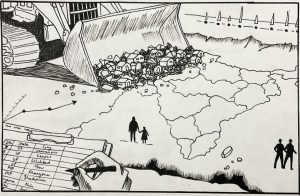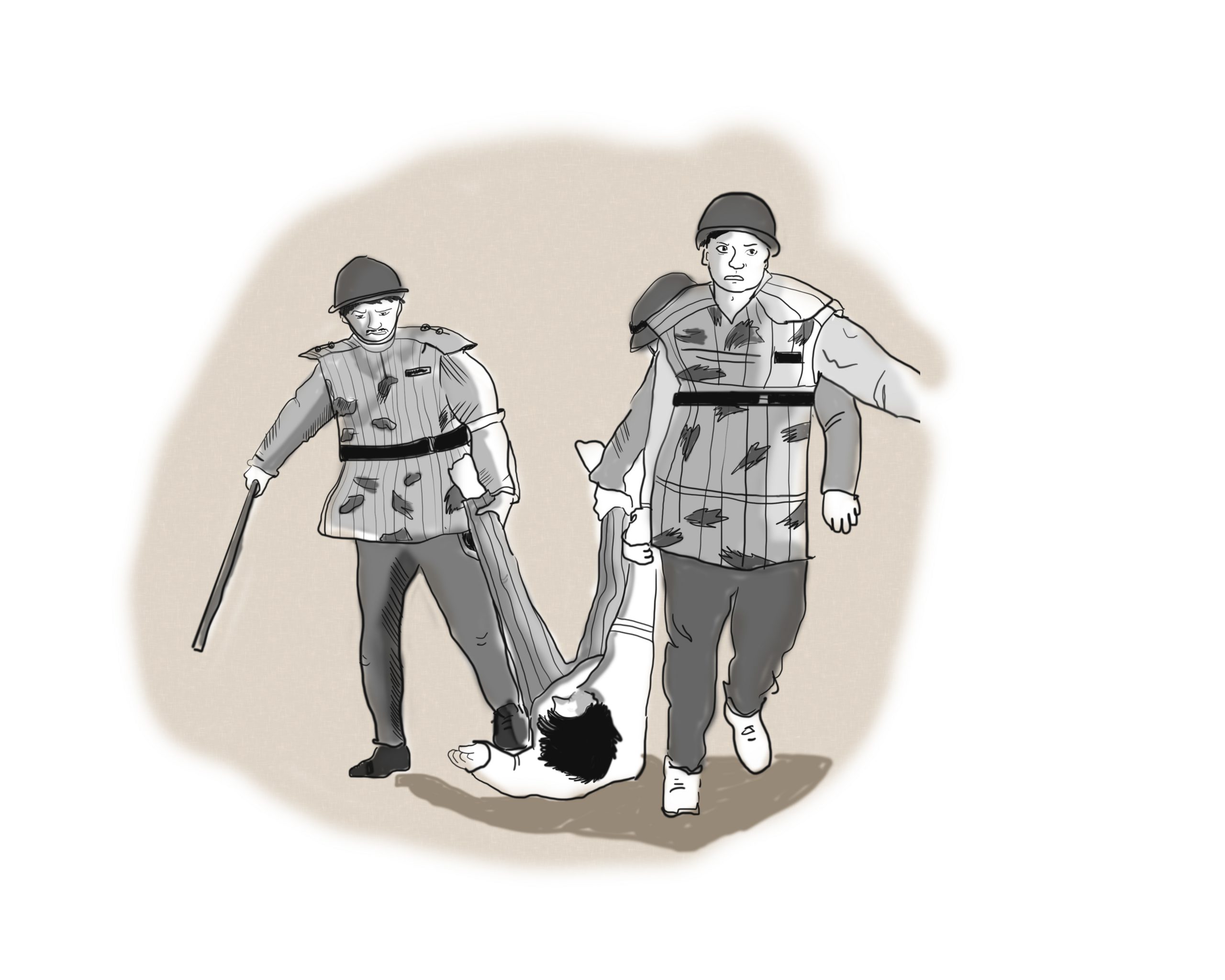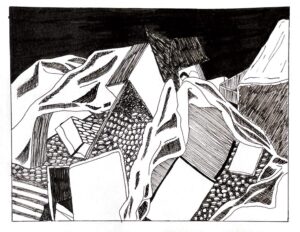
Chasing accountability: The case of custodial deaths in India


Despite existing legal frameworks that guarantee and protect the rights of prisoners, in India custodial deaths and torture often go unpunished.
Police brutality and torture are ubiquitous, along with abuse of authority and discrimination against caste and religious minorities. In this analysis of judicial and administrative accountability in cases of custodial deaths in India, we focus on cases from 2015 and 2016. We selected this time period because enough time has passed to analyze whether any measures of accountability have been taken while being aware of the pace of the Indian criminal justice system.
In the first essay we present the relationship between torture and liberal democracies, official data on custodial deaths in India, legislation at the national and international level on torture by public servants and the rights of prisoners including guidelines for arrest as well as the 15 cases we focus on. We find that despite strict guidelines, authorities routinely fail to conduct rigorous investigations and prosecute police officials implicated in torture and ill-treatment of arrested persons. Police investigators often close cases relying solely on the accounts of the implicated officers.
In the second essay, we focus on police narratives or the “official” version of events. We explore the excuses, reasons and causes for deaths according to the Police and other state bodies in all 15 cases. A judicial inquiry was conducted in only 31 of the 97 custodial deaths reported in 2015. In 26 cases, no autopsy of the deceased was conducted. In some states, an executive magistrate — who belongs to the executive branch of the Government as do the Police and therefore is not independent and is likely to face pressures not to act impartially — conducted the investigation rather than a judicial magistrate. In 2015, the Police registered cases against fellow police officers in only 33 of the 97 custodial deaths.
The third essay analyzes the types of accountabilities that usually take place, if any. We found cases where the victims’ families have not received the ordered compensation money. This section includes the types of enquiries that have taken place in these cases by different governmental bodies and human rights organizations and their current status. We find there have been no convictions or arrests of police personnel involved. In some cases, formal complaints were not even registered against police personnel for torture, whereas the evidence points to the contrary. The Police have been negligent by delaying adequate medical attention for victims of police brutality, which further worsened their condition and eventually led to their death.
The fourth essay focuses on highlighting the impunity with which the Police function and the complicity of state and non-state institutions in aiding and abetting violence, namely deaths in custody, including the medical and judicial fraternity and the mainstream media. This section includes legal hurdles in convicting police officials in cases of custodial deaths and focuses on highlighting existing biases and prejudices within State institutions against certain marginalized communities.
The fifth and concluding essay includes the challenges and limitations of the project, including the scope for future research on accountability in custodial deaths cases in India. We focus on the shift to scientific methods of interrogation, previously proposed recommendations and legislations and highlight some of our own findings and recommendations. We also reflect on conducting research on custodial deaths in India.
***
Acknowledgements
Pooja George and Vedika Inamdar, Research Associates at Watch the State, conducted research and co-authored the report Chasing justice: The case of custodial deaths in India for The Polis Project, Inc.
We would like to acknowledge and thank the following people:
Venkatesh Nayak from Commonwealth Human Rights Initiative (CHRI) for initial conversations and guidance on the project; Jayshree Bajoria, senior researcher at the Human Rights Watch (HRW), for guidance on the project; V. Geetha, feminist activist and scholar, for documents on cases of custodial deaths in Tamil Nadu; Shailesh Poddar, a lawyer based in Jharkhand and Delhi, for assistance on accessing case documents and assistance with RTI applications; Raja Bagga, lawyer and researcher at the Jindal Global Law School, for assistance on the study and with RTI applications; Kirity Roy at MASUM for documents on cases of custodial deaths in West Bengal; Lateef Mohammed Khan at Civil Liberties Monitoring Committee (CLMC) for documents on cases of custodial deaths in Telangana; Leslie Martin for help in contacts for the project; Jinee Lokaneeta for guidance on the project and Amala Dasarathi, lawyer and legal researcher for assistance on accessing case documents. We would also like to thank The Thakur Foundation for providing support and the initial funding for this project.
This research is built on the extensive work done by lawyers, researchers, human rights activists, journalists, families of victims seeking justice, local organizations and networks. We would like to extend our gratitude to all those who have influenced our work. While our attempt is neither comprehensive nor conclusive, we hope that this project will open up further research and engagement with these issues.
Related Posts

Despite existing legal frameworks that guarantee and protect the rights of prisoners, in India custodial deaths and torture often go unpunished.
Police brutality and torture are ubiquitous, along with abuse of authority and discrimination against caste and religious minorities. In this analysis of judicial and administrative accountability in cases of custodial deaths in India, we focus on cases from 2015 and 2016. We selected this time period because enough time has passed to analyze whether any measures of accountability have been taken while being aware of the pace of the Indian criminal justice system.
In the first essay we present the relationship between torture and liberal democracies, official data on custodial deaths in India, legislation at the national and international level on torture by public servants and the rights of prisoners including guidelines for arrest as well as the 15 cases we focus on. We find that despite strict guidelines, authorities routinely fail to conduct rigorous investigations and prosecute police officials implicated in torture and ill-treatment of arrested persons. Police investigators often close cases relying solely on the accounts of the implicated officers.
In the second essay, we focus on police narratives or the “official” version of events. We explore the excuses, reasons and causes for deaths according to the Police and other state bodies in all 15 cases. A judicial inquiry was conducted in only 31 of the 97 custodial deaths reported in 2015. In 26 cases, no autopsy of the deceased was conducted. In some states, an executive magistrate — who belongs to the executive branch of the Government as do the Police and therefore is not independent and is likely to face pressures not to act impartially — conducted the investigation rather than a judicial magistrate. In 2015, the Police registered cases against fellow police officers in only 33 of the 97 custodial deaths.
The third essay analyzes the types of accountabilities that usually take place, if any. We found cases where the victims’ families have not received the ordered compensation money. This section includes the types of enquiries that have taken place in these cases by different governmental bodies and human rights organizations and their current status. We find there have been no convictions or arrests of police personnel involved. In some cases, formal complaints were not even registered against police personnel for torture, whereas the evidence points to the contrary. The Police have been negligent by delaying adequate medical attention for victims of police brutality, which further worsened their condition and eventually led to their death.
The fourth essay focuses on highlighting the impunity with which the Police function and the complicity of state and non-state institutions in aiding and abetting violence, namely deaths in custody, including the medical and judicial fraternity and the mainstream media. This section includes legal hurdles in convicting police officials in cases of custodial deaths and focuses on highlighting existing biases and prejudices within State institutions against certain marginalized communities.
The fifth and concluding essay includes the challenges and limitations of the project, including the scope for future research on accountability in custodial deaths cases in India. We focus on the shift to scientific methods of interrogation, previously proposed recommendations and legislations and highlight some of our own findings and recommendations. We also reflect on conducting research on custodial deaths in India.
***
Acknowledgements
Pooja George and Vedika Inamdar, Research Associates at Watch the State, conducted research and co-authored the report Chasing justice: The case of custodial deaths in India for The Polis Project, Inc.
We would like to acknowledge and thank the following people:
Venkatesh Nayak from Commonwealth Human Rights Initiative (CHRI) for initial conversations and guidance on the project; Jayshree Bajoria, senior researcher at the Human Rights Watch (HRW), for guidance on the project; V. Geetha, feminist activist and scholar, for documents on cases of custodial deaths in Tamil Nadu; Shailesh Poddar, a lawyer based in Jharkhand and Delhi, for assistance on accessing case documents and assistance with RTI applications; Raja Bagga, lawyer and researcher at the Jindal Global Law School, for assistance on the study and with RTI applications; Kirity Roy at MASUM for documents on cases of custodial deaths in West Bengal; Lateef Mohammed Khan at Civil Liberties Monitoring Committee (CLMC) for documents on cases of custodial deaths in Telangana; Leslie Martin for help in contacts for the project; Jinee Lokaneeta for guidance on the project and Amala Dasarathi, lawyer and legal researcher for assistance on accessing case documents. We would also like to thank The Thakur Foundation for providing support and the initial funding for this project.
This research is built on the extensive work done by lawyers, researchers, human rights activists, journalists, families of victims seeking justice, local organizations and networks. We would like to extend our gratitude to all those who have influenced our work. While our attempt is neither comprehensive nor conclusive, we hope that this project will open up further research and engagement with these issues.
SUPPORT US
We like bringing the stories that don’t get told to you. For that, we need your support. However small, we would appreciate it.






